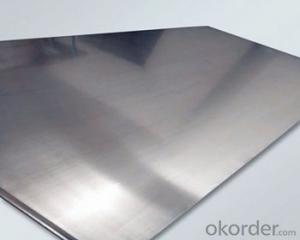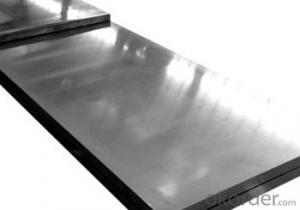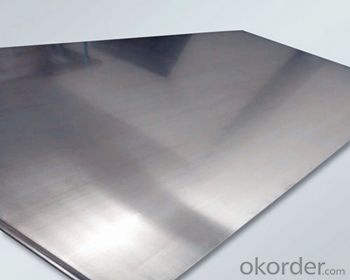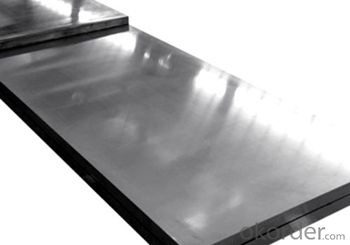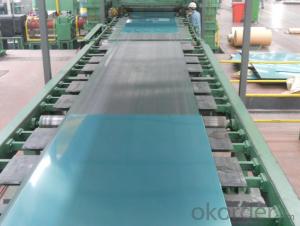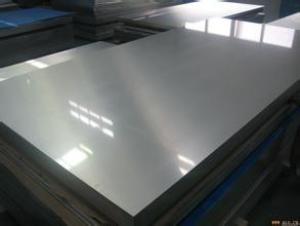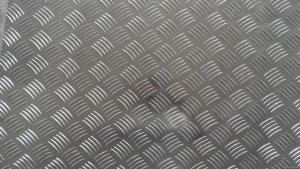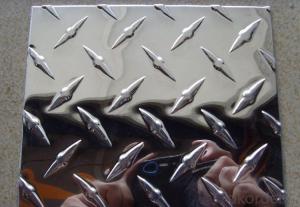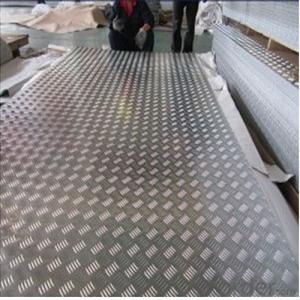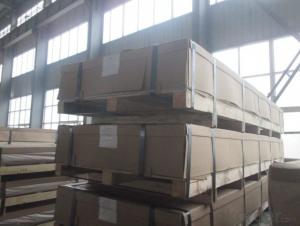High Quality 1060 Aluminum Diamond Plate Sheets with a Good Price
- Loading Port:
- Qingdao
- Payment Terms:
- TT OR LC
- Min Order Qty:
- 10000 kg
- Supply Capability:
- 100000 kg/month
OKorder Service Pledge
OKorder Financial Service
You Might Also Like
Specification
1060 Aluminum Sheet
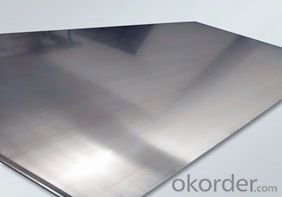
1060 Aluminum Sheet Introduction
1060 aluminum sheet belt, aluminum content of 99.6% or more also known as pure aluminum sheet, belongs to a series of commonly used in the aluminium sheet family. The advantages of this series of aluminum: the most commonly used series, the production process is relatively simple, relatively mature technology, the price relative to other high-grade aluminum alloy has a huge advantage. Has a good elongation and tensile strength, fully able to meet the conventional processing requirements (stamping, stretching) high molding. For industrial pure aluminum, with high plasticity, corrosion resistance, conductivity and thermal conductivity, but the strength is low, heat treatment can not strengthen the machinability is not good; gas welding, hydrogen welding and welding, easy to braze; easy to bear the Pressure processing and extension, bending.
1060Aluminum Sheet Application Scope
1060 aluminum sheet is widely used in products with low strength requirements. Products used in signs, billboards, building exterior decoration, bus body, high-rise and factory wall decoration, kitchen sink, lamp holder, fan blades, electronic parts, chemical equipment, sheet metal processing, deep drawing or spinning Shaped ware, welding parts, heat exchangers, bell surface and disk, nameplate, kitchen utensils, decorations, reflective equipment and so on.
1060 Aluminum Sheet Picture
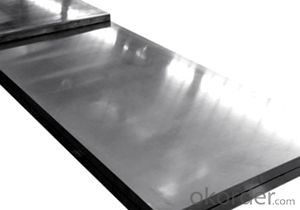
1060 Aluminum Sheet Technical parameters
| Alloy | 1060 Aluminum sheet |
| Temper | O,H14,H16,H18,H22,H24,H26 |
| Thickness (mm) | 0.2 ≤ T≤ 1.0 |
| Width (mm) | 820 ≤ W ≤ 1200 |
| Length (mm) | 1000 ≤ L ≤ 3000 |
| Tensile strength σb (MPa) | 110-136 |
| Elongation rate δ10 (%) | 3-5 |
| Chemical Composition | Al :99.60 Si :0.25 Cu :0.05 Mg:0.03 Zn:0.05 Mn:0.03 Ti :0.03 V:0.05 Fe: 0.350 |
| Typical products | Aluminum-plastic plate, lamp material, fan leaves, capacitor shell, etc |
Introduction of our company
Our company is a professional Aluminium Strip manufacturer and Aluminum Circles manufacturers,mainly supply Aluminium Coil,Aluminum Circles,Aluminium discs,Aluminum Sheet,Aluminum Strip, Household Aluminum Foil,Aluminum Foil for Pharmaceutical Packaging,Aluminum Foil Tape,Aluminum Foil for Air Conditioner,Aluminum Foil for Container etc. series of aluminum products, sincerely welcome everyone to visit.
- Q: Can aluminum sheet be used for signage?
- Yes, aluminum sheet can be used for signage. Aluminum is a popular choice for signage due to its durability, versatility, and cost-effectiveness. It is a lightweight material that is resistant to corrosion, making it suitable for both indoor and outdoor signage. Aluminum sheet can be easily cut, shaped, and formed into various sizes and designs, allowing for customizable signage options. Additionally, aluminum can be easily printed or engraved upon, making it ideal for displaying text, graphics, and logos. Its sleek and professional appearance adds to its appeal for signage purposes. Overall, aluminum sheet is an excellent choice for signage due to its durability, versatility, and aesthetic qualities.
- Q: How do aluminum sheets perform in terms of thermal expansion?
- Aluminum sheets exhibit a relatively high coefficient of thermal expansion, causing them to expand significantly under heat and contract when cooled. This behavior stems from aluminum's nature as a metal with a relatively low melting point and excellent heat conductivity. Heating aluminum sheets increases the energy of its metal atoms, causing them to vibrate and move more rapidly, resulting in expansion. Conversely, cooling the sheets reduces their energy, causing the metal atoms to slow down and move closer together, leading to contraction. Therefore, it is crucial to consider the thermal expansion properties of aluminum sheets when using them in applications that involve temperature fluctuations, as this can impact the material's overall dimensions and performance.
- Q: How much is the price of the 6061 aluminum plate?
- You ask the question is not detailed enough, because 6061 aluminum thick and thin prices are different, domestic and imported prices are different, domestic quality of different prices are also different.
- Q: What are the colors of iron sheet and aluminum sheet?
- red, white
- Q: I broke the swing-arm of a cut-off saw, need to know how to weld it back. I have a stick welder and can weld steel, but have never messed with cast aluminum.
- Tig weld is your best answer. Look for a local welding shop in your area. They usually have a minium hourly fee. I'd guess it'd be between $50-$75.
- Q: Can the aluminum sheets be used for manufacturing aircraft engine components?
- Yes, aluminum sheets can be used for manufacturing aircraft engine components due to their lightweight, high strength, and good corrosion resistance properties.
- Q: i have a aluminum bicycle the first time i painted it i painted over the original paint(didnt know any better). The second time i sanded it down with some paint left on it. Now this time im sanding it but im using 60grit it looks good to me is 60 grit to much.
- Home or do-it-yourself spray jobs most of the time come out looking like - fill in word of your choice. Why? Because the person hasn't done their homework in advance. First, you will need to strip the bike down to the bare frame - remove everything. Are you qualified to do all of this? Do you have all the tools needed? The next best step would be to have the frame professionally sand blasted, powder-coated clear coated by possibly an auto body shop that does this kind of thing on the side. Can't do that? Consult Google link below. So much FREE information on the Internet, it's amazing.
- Q: To an idiot, this may seem like a stupid question: its just aluminum. But it may not be.However seeing that I am only a high school student and don't have access to aluminum power (which is what I desire for an independent experiment) so I'd like to grind consumer grade aluminum foil down bases of Mohs scale of Hardness.My concern is that aluminum foil is Aluminum oxide which is a 9 (10 being diamond, 1 being talcum powder) and this would be horribly difficult to grind.If it is Alumina, that's only a 3.5.If it does happen to be aluminum oxide, can you think of a way to remove the Oxygen. Would nitric acid work.
- It is not aluminum oxide. It's pretty much pure aluminum, though it may be coated with a very thin layer of wax or plastic. As for the independent experiment, be careful and wear goggles and other protective clothing. I was in high school once too, and can tell you from experience that thermite burns very, very hot and is quite good at melting or combusting a wide variety of materials. It also requires a fairly hot ignition source, and magnesium strips are often used for that purpose as a kind of fuse. If you don't have access to that, figure something else out, but do *not* attempt to light thermite directly with a blowtorch. You want to be much farther away by the time it lights, and it would be a bad idea to lay the torch there and back away because that places the torch's potentially explosive fuel supply much too close to the reaction.
- Q: What are the electrical conductivity properties of aluminum sheets?
- Aluminum sheets have excellent electrical conductivity properties due to their high thermal and electrical conductivity. They are widely used in various electrical applications, such as wiring, power transmission lines, and electrical enclosures.
- Q: I am doing some exam review and do not know how to do these...Calculate the number of Nitrate ions in 3.99 g or aluminum nitrate.
- OK - first you need the ENTIRE mass of the aluminum nitrate (gram formula mass). You need the correct formula for aluminum nitrate, then add up the atomic masses from the periodic chart. Then, you need to convert 3.99 g of aluminum nitrate to moles of aluminum nitrate. (grams/formula mass = moles) Then, you need to take into account how many moles of nitrate ions are in a mole (look at the correct formula for aluminum nitrate). Then multiply by the number of moles you calculated (moles of ions per molecule x #moles). This would be moles of ions. You need individual ions you would the multiply by 6.02 x 10^23 ions/mole. SO: grams of sample divided by formula mass x #nitrate ions per molecule x (6.023 x 10^23 ions per mole) = # ions
Send your message to us
High Quality 1060 Aluminum Diamond Plate Sheets with a Good Price
- Loading Port:
- Qingdao
- Payment Terms:
- TT OR LC
- Min Order Qty:
- 10000 kg
- Supply Capability:
- 100000 kg/month
OKorder Service Pledge
OKorder Financial Service
Similar products
Hot products
Hot Searches
Related keywords
